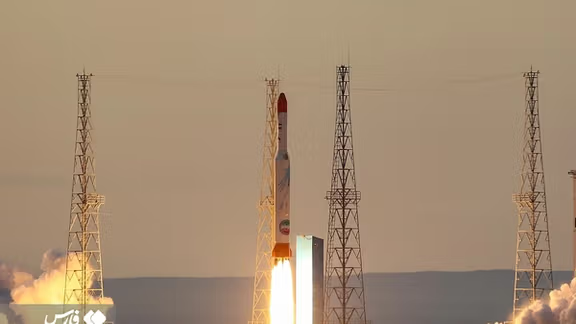Iran Says Space Rocket Failed To Put Payloads Into Orbit

Iran's space rocket launch on Thursday failed to put its research payloads into orbit after the vehicle was unable to reach the required speed, spokesman said.

Iran's space rocket launch on Thursday failed to put its research payloads into orbit after the vehicle was unable to reach the required speed, spokesman said.
"For a payload to enter orbit, it needs to reach speeds above 7,600 (meters per second). We reached 7,350," the spokesman, Ahmad Hosseini, said in a documentary about the launch vehicle broadcast on state TV and posted online.
On Thursday, Hosseini did not clarify whether the devices had reached orbit, but suggested the launch was a test ahead of coming attempts to put satellites into orbit.
Iran, which has one of the widest missile programs in the Middle East, has suffered several failed satellite launches in recent years due to technical issues.
Washington has said it is concerned by Iran’s development of space launch vehicles, and a German diplomat said Berlin had called on Iran to stop sending satellite launch rockets into space, adding that they violated a UN Security Council resolution.
France said on Friday the rocket launch aimed at sending three research devices into space violated UN rules and was "even more regrettable" as nuclear talks with world powers were making progress.
Iran’s deputy defense minister said Friday that Iran will carry out more space launches until March and added that it will use an advanced version of its Simorgh rocket, that was used in the latest launch.
Iran's foreign ministry rejected the US, German and French criticism of Tehran's launch of the satellite-carrying rocket.
"Scientific and research advances, including in the field of aerospace, are the inalienable right of the Iranian people, and such meddling statements will not undermine the Iranian people's determination to make progress in this field," it said in a statement.
There has been suspicion that Thursday’s launch might be a message, for audiences foreign and domestic, that Iran is negotiating from strength in Vienna and will not accept demands that it unliterally scale back its missile program.
Tehran denies that its space activity is a cover for ballistic missile development or that it violated a UN resolution.
A UN resolution in 2015 "called upon" Iran to refrain for up to eight years from work on ballistic missiles designed to deliver nuclear weapons following the nuclear agreement with six world powers. Some states said the language did not make such a pledge obligatory.
Iran says it has never pursued the development of nuclear weapons and, therefore, the resolution does not apply to its ballistic missiles, which Tehran regards as an important deterrent and retaliatory force against US and other adversaries in the event of war.
Gulf Arab states and Israel have serious concerns over Iran’s ballistic missiles, considering threats by Iran’s military and senior officials to wipe Israel off the map. In September 2019, a large scale missile and drone attack launched against Saudi Arabia’s oil installations were attributed to Iran.
Iran launched its first satellite Omid (Hope) in 2009, and its Rasad (Observation) satellite was sent into orbit in 2011. Tehran said in 2012 that it had successfully put its third domestically made satellite, Navid (Promise), into orbit.
In April 2020, Iran said it successfully put the country's first military satellite into orbit, following repeated failed launch attempts in previous months.
The United States imposed sanctions on Iran's civilian space agency and two research organizations in 2019, saying they were being used to advance Tehran's ballistic missile program.
With reporting by Reuters